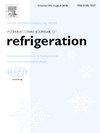Comparative investigation on water fouling characteristics in 5 mm and 7 mm tubes with smooth type and screwed type
IF 3.5
2区 工程技术
Q1 ENGINEERING, MECHANICAL
International Journal of Refrigeration-revue Internationale Du Froid
Pub Date : 2024-11-06
DOI:10.1016/j.ijrefrig.2024.11.003
引用次数: 0
Abstract
Application of copper tubes with the diameter of 5 mm instead of 7 mm in chillers of central air conditioning systems is the development tendency due to the requirement of copper material saving. However, the heat transfer deterioration by water fouling precipitated in 5 mm tubes may be more serious than that in 7 mm tubes. The purpose of this paper is to comparatively investigate the water fouling characteristics on both 5 mm and 7 mm tubes. An accelerated experimental method of water fouling process was designed to quickly evaluate the fouling degree. Four tube types are tested, i.e. a 7 mm smooth tube, a 7 mm screwed tube, a 5 mm smooth tube and a 5 mm screwed tube, and these tubes are fabricated as flexible coiled tubes with total length of 200 cm. The results show that the water fouling process experiences the initiation, growth and stabilization stages in sequence, and the crystal form of fouling is in the vaterite, aragonite and schistosity patterns respectively. The fouling masses in 5 mm smooth tube and 5 mm screwed tube are respectively 42.1% and 16.9% larger than those in 7 mm smooth tube and 7 mm screwed tube, meaning that 5 mm tubes are more prone to form water fouling compared with 7 mm tubes; while the averaged fouling mass in screwed tubes is 2.8% lower than that in smooth tubes since screwed tubes are benefit to destroy the integrality of fouling layer and enhance the removal of deposited particulates.
平滑式和螺纹式 5 毫米和 7 毫米管中水垢特性的比较研究
由于需要节省铜材料,在中央空调系统的冷却器中使用直径为 5 毫米而非 7 毫米的铜管成为一种发展趋势。然而,与 7 毫米铜管相比,5 毫米铜管中析出的水垢造成的传热恶化可能更为严重。本文旨在对 5 毫米和 7 毫米管道的水垢特性进行比较研究。为了快速评估结垢程度,我们设计了一种加速水结垢过程的实验方法。测试了四种类型的管子,即 7 毫米光滑管、7 毫米螺纹管、5 毫米光滑管和 5 毫米螺纹管,这些管子被制作成总长度为 200 厘米的柔性盘绕管。结果表明,水污垢过程依次经历了萌发、生长和稳定阶段,污垢的晶体形态分别为辉绿岩型、文石型和片岩型。5 毫米光滑管和 5 毫米螺旋管的污垢质量分别比 7 毫米光滑管和 7 毫米螺旋管的污垢质量大 42.1%和 16.9%,这意味着 5 毫米管比 7 毫米管更容易形成水垢;而螺旋管的平均污垢质量比光滑管低 2.8%,因为螺旋管有利于破坏污垢层的整体性,提高沉积颗粒的去除率。
本文章由计算机程序翻译,如有差异,请以英文原文为准。
求助全文
约1分钟内获得全文
求助全文
来源期刊
CiteScore
7.30
自引率
12.80%
发文量
363
审稿时长
3.7 months
期刊介绍:
The International Journal of Refrigeration is published for the International Institute of Refrigeration (IIR) by Elsevier. It is essential reading for all those wishing to keep abreast of research and industrial news in refrigeration, air conditioning and associated fields. This is particularly important in these times of rapid introduction of alternative refrigerants and the emergence of new technology. The journal has published special issues on alternative refrigerants and novel topics in the field of boiling, condensation, heat pumps, food refrigeration, carbon dioxide, ammonia, hydrocarbons, magnetic refrigeration at room temperature, sorptive cooling, phase change materials and slurries, ejector technology, compressors, and solar cooling.
As well as original research papers the International Journal of Refrigeration also includes review articles, papers presented at IIR conferences, short reports and letters describing preliminary results and experimental details, and letters to the Editor on recent areas of discussion and controversy. Other features include forthcoming events, conference reports and book reviews.
Papers are published in either English or French with the IIR news section in both languages.

 求助内容:
求助内容: 应助结果提醒方式:
应助结果提醒方式:


